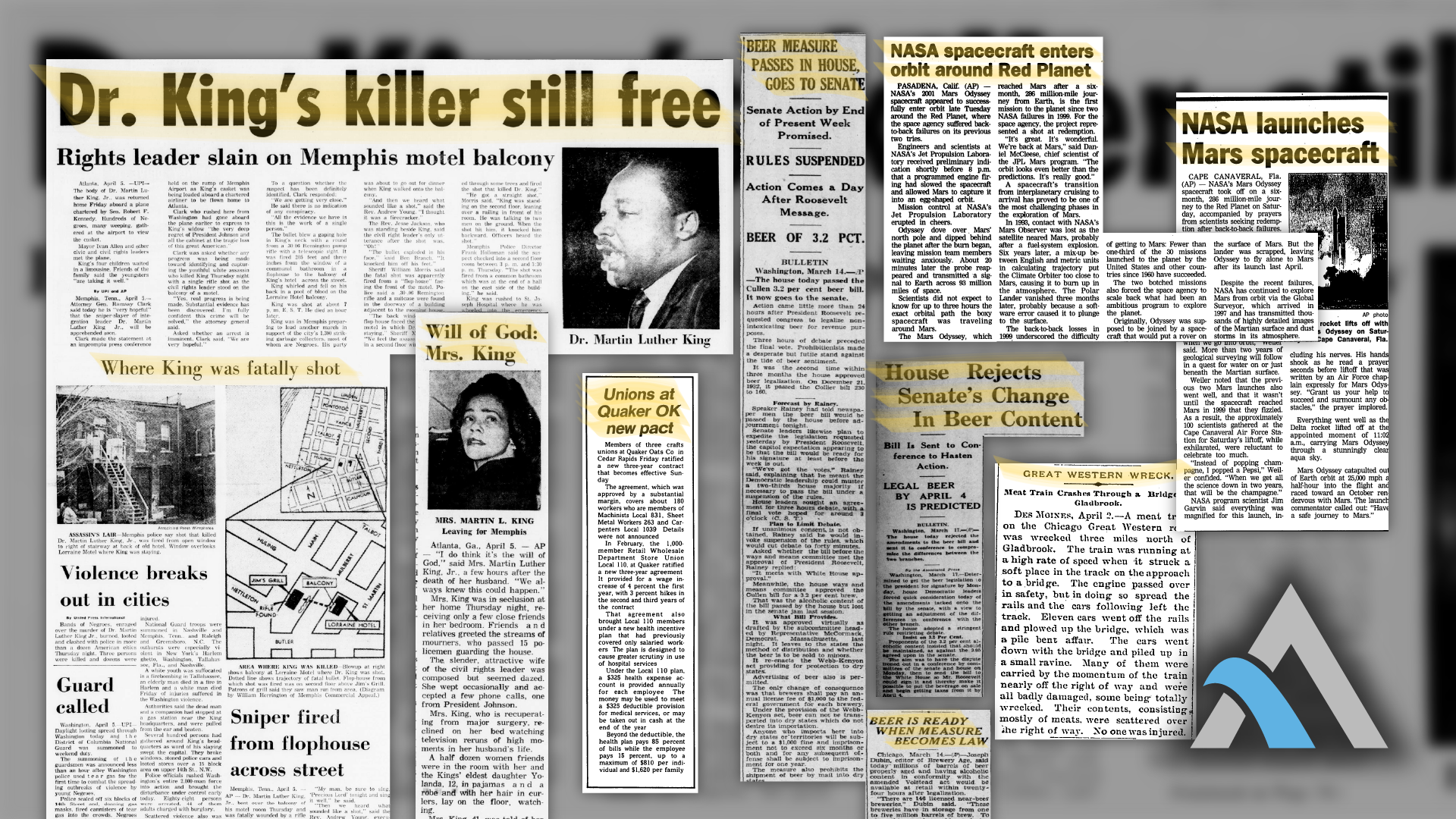From exploring space to civil rights leaders being assassinated, this week in history brought not only memorable tragedies but also local stories that aren’t often talked about. This week not only am I providing you with some fascinating historical information, but also even more in-depth search tips. I learned a lot this week on how to better utilize the filters in my search, and I will be sharing that information in hopes that will make it even easier for anyone to use the CHA.
The Digital and Information Age (2000s – Present): Mars Odyssey Launched, 2001
On April 7th, 2001 NASA launched the Mars Odyssey Orbiter. The project was developed by NASA and contracted to Lockheed Martin, who constructed the orbiter. It was estimated that the orbiter cost around $297 million. The Odyssey was launched from the Cape Canaveral Air Force Station in Florida, with the mission of surveying and studying the natural environment on Mars. The Mars Odyssey began orbit on October 24th, 2001, and is now the longest continually active spacecraft to orbit around a planet that isn’t Earth, having been orbiting for 22 years and counting! One of the Odyssey’s most notable discoveries is the basic distribution of water under the surface of Mars, which helped initiate further Mars exploration.
To find an article on this, I started by searching for the keyword “Mars Odyssey” and any of the words “Mars”, “nasa”, “launch”, and “rover”. I limited the dates from January 1st, 2001, to today, and this got me 246 results. I noticed many of the results were about other Mars rovers, so I added a filter to exclude the most common ones, such as the Curiosity rover. After that only cut out 3 results, I realized I instead needed to exclude the word “rover” as the Odyssey was only referred to as an orbiter. I also added the word Florida to my included words, and this got me down to 54 results that were very relevant to what I was looking for!
The Late 20th Century: Cold War and Globalization (1980s – 2000s): Union Workers at Quaker Reach Deal, 1984
This event is something local for me, being close to Cedar Rapids where the Quaker Oats facility is located. On April 6th, three unions at the factory reached a deal on a three-year contract that would go into effect the following Sunday. The new contract covered hundreds of workers and included improved healthcare plans. A $325 health expense account was provided to each worker, which was to be used to reach deductibles. The plan would also cover 85% of all medical bills to a certain price limit.
To find this, I went to the Cedar Rapids Public Library CHA and chose a random Gazette from this week in the 80s. I found this piece that I found particularly interesting by browsing through the various pages.
Post-War Prosperity and Challenges (1945 – 1980s): Martin Luther King Jr. Assassinated, 1968
On April 4th, 1968, Martin Luther King Jr was staying at the Lorraine Motel in Memphis Tennessee. He was in Memphis to help lead a march for striking sanitation workers. At 6:05 pm, King stepped outside his room on the second floor and paused to converse with his colleagues from the balcony. A single shot was fired at King, hitting the lower right side of his face. He was then rushed to Saint Joseph’s Hospital, where doctors pronounced him dead at 7:05. King’s wife reportedly learned of his death while on her way to Memphis.
Martin Luther King Jr was one of the biggest leaders of the civil rights movement, serving as a peaceful protester for equal rights. As a highly controversial figure, he was no stranger to threats on his life, but that didn’t prevent him from continuing to fight in every moment he could.
The perpetrator behind King’s assassination is still one of the most widely debated topics. James Earl Ray was convicted of the crime after a two-month manhunt, but three days after he pleaded guilty he withdrew his plea and denied his responsibility. King’s family has said they do not believe that Ray was responsible for his death, but everything else is a matter of conspiracy.
Because King was such an important figure, articles were abundant for me to sort through. I used the Quincy Public Library CHA because I know it has an extensive database and that one of its papers, the Quincy Herald-Whig, would provide an interesting perspective. I started by searching the keyword “king” and any buzz words I felt relevant, such as “Martin Luther King Jr” and “killed”, and narrowed the dates from 1960 to 1970. That turned up almost 22,000 results, so I looked at the pages to see what words I could filter out. I saw a few articles talking about someone named Delta King, so I filtered out the word delta. This cut a couple of thousand results out, and from there I just played around with some more filters. I ended up with about 11,000 results, which is still quite a few but not as many as I started with.
If you want to read more about Martin Luther King Jr and his legacy, be sure to check out this piece from Advantage that goes even more in-depth!
The World Wars Era (1914 – 1945): Cullen-Harrison Act, 1933
On April 7th, 1933, The United States got one step closer to the end of Prohibition. The Cullen-Harrison Act was passed to legalize the sale of low-alcohol beer, containing 3.2% or less alcohol content. The act was sponsored by Senator Pat Harrison of Mississippi and Representative Thomas H. Cullen of New York. From the Quincy Public Library Community History Archive, I was able to find some interesting publications and followed the story as it passed through each branch of government. Once the act was given to the Senate, they attempted to change the limit from 3.2% to 3.05%, but the House rejected this change. The Senate also added an amendment that would prevent the sale of alcohol to anyone under the age of 16, which is where we see the early stages of underage drinking laws. Other elements included in this act are the ability to advertise alcoholic beverages, an annual license fee of $1000 a year (almost 24 Thousand Dollars in today’s money) to sell or produce alcohol, and the option for “dry” states. This would mean that each state would be able to decide whether to still ban all alcohol or to allow low-alcohol beer.
Many were in favor of this act, expressing excitement about the act. One brewery even claimed that they would have beer available within 24 hours of it being legal. The act was signed into law by President Roosevelt on March 21st, 1933, and went into effect on April 7th. This act was a big step towards ending prohibition, which came in December.
To find pieces on this issue, I used the Quincy Public Library CHA. I searched for “Cullen Harrison Act” as my key term, and then added a filter to include any relevant words I could think of, such as “beer”, “house”, “senate”, and “prohibition”. This gave me 24 results, but some of them weren’t relevant. I noticed the irrelevant ones were about movies and actors, so I added another filter to include none of those words, and this brought me down to 14 quality pieces to choose from.
The Industrial Revolution to the Early 20th Century (1824 – 1914): Iowa Train Wrecks, 1897
This week I challenged myself to try to find something a little different from what I usually write about. That is how I found myself looking at small-town news from Marion Iowa. I browsed through old editions of the Marion Sentinel, and here I found some interesting local news!
Over this week in the year 1897, there were two separate train wrecks in the state of Iowa, both on the Chicago Great Western Railroad. The first happened on April 2nd, and it was a much bigger disaster. In Des Moines, a train was heading towards a bridge when it hit a soft spot on the tracks. This caused the train to derail, and while the engine made it over the bridge, 11 train cars got derailed and piled up on the bridge. The bridge and derailed cars collapsed into the ravine below. Luckily, no one was injured in the wreck.
The second train wreck was much smaller. On April 3rd in Mason City, a train went into the ditch, but how it got there is not specified. No injuries were reported, however, it said that four men were “badly shaken up”. Additionally, it was said that there was a lot of property damage from the accident.
One great thing about Community History Archives is that there is so much more than just big newspapers included in them. There are small-town papers that report on the daily happenings, there are atlases and yearbooks, and there are even some interesting publications that fall into the “other” category. There is something for every type of historical document you could be looking for!


